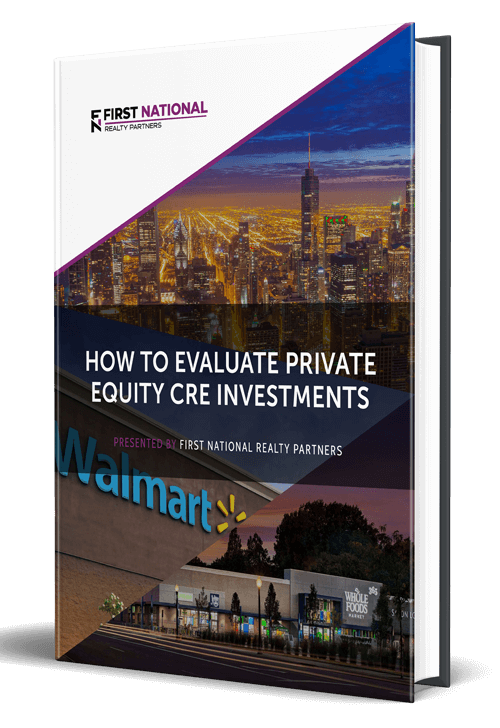An Investor’s Guide to the Ground Rent Capitalization Method
In most commercial real estate transactions, a property is purchased in a “fee simple” arrangement. However, there are cases – most notably raw land – where, for whatever reason, the property owner is unwilling to sell the property outright. But, they are willing to enter into a ground lease that requires the investor to pay “ground rent” in return for the privilege of being able to develop something on the property. In order to value this stream of ground rental income, investors typically use the Ground Rent Capitalization Method.
In this article, we are going to discuss the ground rent capitalization method. We will define what it is, how it is calculated, and why it is important in a real estate investment that involves ground rent. By the end, investors will be able to use their knowledge of this valuation methodology as part of their pre-investment due diligence process.
At First National Realty Partners, we specialize in the acquisition and management of grocery store anchored retail centers. If you are an accredited investor and would like to learn more about our current opportunities, click here.
What is Ground Rent?
In the simplest sense, ground rent is money paid to a landowner in return for the opportunity to develop some type of structure on it. To highlight how this type of arrangement typically works, an example is helpful.
Suppose that a family has owned a parcel of land for a long time. And, over that period of time, a bustling real estate market has emerged around the property making it incredibly valuable to real estate developers. The family is often approached with offers to purchase the land, but they are refused because the family is confident that the property will continue to increase in value. But, one day a developer comes with a different type of offer. Instead of buying the land outright, they offer to lease it from the family – providing them with a steady stream of rental income – in return for the ability to build a project on top of the land.
In many cases, this is a win/win for both the property owner and the developer. The property owner gets the stream of rental income and gets to retain ownership of the land. In some cases, the lease terms even call for ownership of the developed project to revert back to the property owner at the end of the lease term. And the developer gets access to a prime piece of real estate without having to purchase it so their cost basis for the project is much lower. In addition, the ground rent lease terms are usually very lengthy – like 50-99 years – so it provides a time period that is plenty sufficient to earn their investment back.
For the purposes of using the ground rent capitalization method, the key point to remember about ground rent is that it represents a stream of income for a property owner.
What is The Ground Rent Capitalization Method?
The stream of income represented by the terms of the ground lease has a value and the ground rent capitalization method is one way to estimate the market value of the land.
How Ground Rent Capitalization is Calculated
The formula used to “capitalize” ground rent is very simple. It is Annual Income / Capitalization Rate. To understand it works, it is helpful to understand how each of these inputs are derived.
Annual income represents the amount of annual rent, net of operating expenses. In a typical ground rent scenario, there aren’t likely to be many operating expenses, but they usually include things like property taxes, insurance, depreciation, and some small amount of maintenance. For example, if the annual ground rent is $150,000 and the operating expenses are $25,000, the number to use in the numerator would be $125,000.
The capitalization rate can be a little bit trickier to figure out, but it is generally a combination of the expected rate of return on the investment and the cap rate on sales of comparable properties. It should be noted that the cap rate has an inverse relationship to land value. A higher cap rate means that investors are demanding a higher rate of return on the asset so they would place a lower value on the property. Alternatively, a lower cap rate means that the land valuation is higher. For the example above, assume a cap rate of 8%.
So, if the annual income is $125,000 and the cap rate is 8%, the estimated value of the property is $125,000 / 8% or $1,562,500.
When to Use The Ground Rent Capitalization Method
The ground rent capitalization method should be used whenever there is a stream of income that requires “direct capitalization.” This could involve a land lease for vacant land, but this type of “income approach” could also be used for any commercial real estate asset. In doing so, the “annual income” is represented by Net Operating Income (NOI) on the property income statement and the capitalization rate is chosen based on the required return, just like above.
Or, maybe the easier way to think about it is that it would be appropriate to use the ground rent capitalization method any time there is an investment or project that involves ground rent. The outcome of the calculation is an estimation of the land value.
The Importance of Understanding Ground Rent Capitalization for Investors
Understanding how to capitalize ground rent is important for real estate investors, because this is a key input into creating an investment pro forma that attempts to project income, expenses, and returns for an investment that involves ground rent. Without this knowledge, investors would be unable to properly estimate returns, which negates the point of the investment.
Other Valuation Approaches
When an appraiser is hired to provide a value estimate for a property, they typically use three approaches.
The first is the income capitalization approach, which is very similar to ground rent capitalization. In it, an appraiser would estimate the income and expenses for a property and then apply a capitalization rate to net operating income to determine value.
The second is the sales comparison approach, which looks for the sales price of similar properties that are in the same market. From these, the appraiser would make adjustments relative to the subject property to determine an appropriate price per square foot. Then, they would apply this per square foot value to the property being appraised to determine the total property value.
The third approach is the cost approach, which seeks to determine the required cost to reproduce the property being appraised using modern building techniques and materials.
Often, the appraiser will use all three approaches, but may give one more weight over another based on the unique characteristics of the property. In a ground lease, where an individual has a leasehold interest in the property, income capitalization method is likely to be the preferred method for estimating land value.
How The Ground Rent Capitalization Method Applies to Private Equity Real Estate
Any type of transaction that involves a ground lease can be especially complicated. The terms of the lease are critical to the transaction and the ability of the real estate developer to execute on the project have a major impact on the success of the investment. Managing the details of the development project can be incredibly time consuming and requires an exceptional level of expertise to do well. For this reason, many individual investors may prefer to work with a private equity firm to help. In such a scenario, the individual investor makes a capital allocation to a partnership with the private equity firm who does all of the hard work of managing the project for the improved property.
For example, we specialize in the purchase and management of grocery store anchored retail centers. On occasion, some of the properties that we purchase have one or more “retail pads” that are undeveloped. One of the ways that we could add value to the property is to either sell that pad outright or to enter into a partnership with a real estate developer where we would ground lease the parcel to them and they would develop a project that is both complementary to our grocery store anchor and the highest and best use for the site. Often this could be a bank, quick service restaurant, or coffee shop. This income stream/land income can prove to be a major benefit for our investors because it can improve the value of the overall asset.
Summary of the Ground Rent Capitalization Method
Ground rent is money paid by a real estate developer for the privilege of being able to build a project on a site that they do not own.
In order to agree on proper site valuation, investors and appraisers typically use a number of valuation techniques, one of which is known as ground rent capitalization.
Ground rent capitalization is calculated as the annual income stream divided by the land capitalization rate, which represents a combination of an investor’s required return and the capitalization rate for sales of similar properties in the same market.
This type of direct income capitalization is just one of three valuation techniques that an appraiser may use to value a property. The other two are the cost approach and the sales comparison approach.
A deal that involves ground rent and a leased fee interest in a property is more complex than a run of the mill “fee simple” transaction. For this reason, it may be a good idea for individual investors to partner with a private equity firm in this type of transaction. In it, the firm does all of the hard work of managing the logistics of the ground lease, estimating site value, and working with the developer to execute the completion of a project on the land. Doing so can save individuals a lot of time and frustration while also earning them passive income.
Interested In Learning More?
First National Realty Partners is one of the country’s leading private equity commercial real estate investment firms. With an intentional focus on finding world-class, multi-tenanted assets well below intrinsic value, we seek to create superior long-term, risk-adjusted returns for our investors while creating strong economic assets for the communities we invest in.
If you are an Accredited Real Estate Investor and want to learn more about our investment opportunities, contact us at (800) 605-4966 or info@fnrpusa.com for more information.






